
As Grade 10 student council president, Leonard Mandamin, '82 LLB, led a vote to reject his school principal's plan to have older student prefects report on children who spoke their own language - Anishinaabemowin - at his Indian reserve school.
Mandamin, who grew up on the Wikwemikong Unceded Indian Reserve on Manitoulin Island, was influenced by an elderly council member who had once defied a government Indian agent's demand that council meetings be conducted in English only.
"In the late 1950s early 1960s, the predominant treatment of Indians had a very negative outlook on Indigenous culture," says Mandamin. "Language was suppressed, ceremony and celebration were discouraged."
But in the 1960s, Wikwemikong re-introduced the powwow, helping revive Indigenous culture. That inspired Mandamin to become involved in Indigenous activism and then to study law.
As a lawyer representing Indigenous clients across Alberta, a Provincial Court judge who also presided over traditional justice initiatives, and now as a Federal Court justice, he wove Indigenous perspectives into the Canadian justice system.
In R v. Badger, a leading Supreme Court of Canada decision on the scope of Indian treaty rights, Mandamin represented one of three treaty Indian hunters charged for hunting without a license or out of season, though their treaty assured them of the right to hunt for food. The Court confirmed the continued existence of that treaty right, in a decision that is frequently cited. "It was a milestone for treaties," says Mandamin. "The Supreme Court said that treaties are sacred and that the spirit and intent of treaties should be honoured."
Mandamin was also counsel before the Indian Claims Commission in the Cold Lake First Nations Claim. The First Nations were expelled from their traditional hunting, trapping and fishing territories in 1954 so the federal government could establish the Primrose Lake Air Weapons Range. Mandamin assisted them in their claim for compensation for many years. The claim was accepted, and negotiations were underway when Mandamin was appointed to the Provincial Court of Alberta. Later compensation provided land, economic benefits and a multimillion dollar settlement.
As a Provincial Court judge, Mandamin helped the Tsuu T'ina First Nation establish a peacemaker court that still works with community peacemakers to resolve conflicts that give rise to criminal offenses. At the Federal Court of Canada, Mandamin participated in the development of its Aboriginal Litigation Guidelines, which recognize the important role of Indigenous elders and makes sure they are treated with respect during litigation.
Now a supernumerary justice who will retire in August 2019, Mandamin also cherishes other accomplishments, such as encouraging Indigenous law students who articled or clerked with him. "I take satisfaction in having been able to assist people in matters that were important to them."